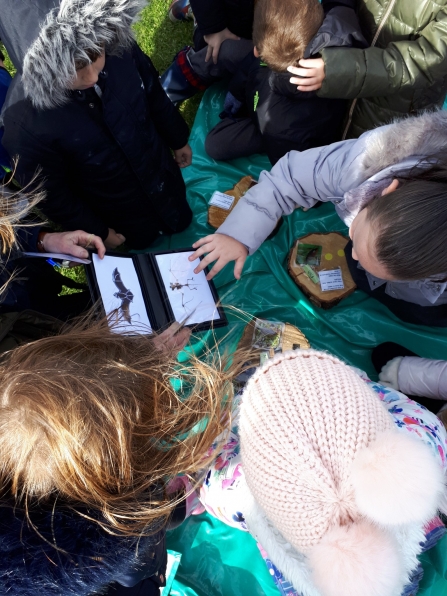
Pupils from Amberley First School learning outdoors with Northumberland Wildlife Trust. Image by: Lynette Friend.

Pupils from Amberley First School learning outdoors with Northumberland Wildlife Trust. Image by: Lynette Friend.
Overall, the research revealed that children’s wellbeing increased after they had spent time connecting with nature: the children showed an increase in their personal wellbeing and health over time; they showed an increase in nature connection and demonstrated high levels of enjoyment.
The children also gained educational benefits as well as wider personal and social benefits:
Mike Pratt, Northumberland Wildlife Trust Chief Executive says: “This research shows that children experience profound and diverse benefits through regular contact with nature. Contact with the wild improves children’s well-being, motivation and confidence. The data also highlights how children’s experiences in and around the natural world led to better relationships with their teachers and class-mates.
“The Wildlife Trusts believe everyone should have the opportunity to experience the joy of wildlife in daily life and we’re calling on government to recognise the multiple benefits of nature for children - and ensure that at least one hour per school day is spent outdoors learning and playing in wild places.”
The UCL research team studied children participating in outdoor activities with their local Wildlife Trust, ranging from a single activity, to a series of activities over the course of several weeks. 451 children (mostly 8 - 9 years of age) in 12 areas across England took part by completing surveys before and after they participated in outdoor activities. Additionally, teachers, Wildlife Trust educators and 199 of the children were also observed by the UCL research team and interviewed about their experiences.
The outdoor activities involved children learning about nature, such as identifying plants and trees, reflecting on their important role in our lives and considering the needs of wildlife habitats.
The nature connection of the children was also measured. Nature connection refers to the level at which a person considers nature to be a part of their identity, reflecting their emotional closeness to the natural world. Nature connection essentially includes a love of nature and care and concern for the environment.
Professor Michael Reiss, Institute of Education, UCL, says: “Each generation seems to have less contact with the outdoors than the preceding one. We owe it to all young people to reverse this trend – for their sakes, for our sakes and for nature’s sake.”
UCL - London’s Global University
UCL is a diverse community with the freedom to challenge and think differently.
Its community of more than 41,500 students from 150 countries and over 12,500 staff pursues academic excellence, breaks boundaries and makes a positive impact on real world problems.
It is consistently ranked among the top 10 universities in the world and are one of only a handful of institutions rated as having the strongest academic reputation and the broadest research impact.
It has a progressive and integrated approach to our teaching and research – championing innovation, creativity and cross-disciplinary working. It teaches its students how to think, not what to think, and see them as partners, collaborators and contributors.
For almost 200 years, it is proud to have opened higher education to students from a wide range of backgrounds and to change the way it creates and shares knowledge.
It was the first in England to welcome women to university education and that courageous attitude and disruptive spirit is still alive today.